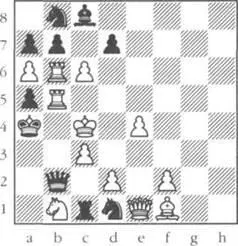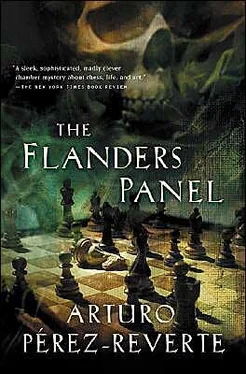Cesar pursed his lips.
“I’m afraid, my dear, that’s exactly what it is.” He looked at Munoz. “Go on, Holmes,” he added with a friendly smile. “We’re on tenterhooks.”
One corner of Munoz’s mouth twitched humourlessly, a mere polite reflex action. It was clear that all his attention was taken up by the chessboard. His eyes seemed even more deeply sunk in their sockets and there was a feverish gleam in them: the expression of someone absorbed in contemplating imaginary, abstract spaces that only he could see.
“Now,” he suggested, “let’s look at the possible moves the queen could have made, positioned as she is on square c2. I don’t know if you’re aware, Julia, that the queen is the most powerful piece in the game. She can move across any number of squares, in any direction, imitating the movement of all the other pieces except for the knight. As we can see, the black queen could have come from four possible squares: a2, b2, b3 and d3. By now, you can see for yourself why she couldn’t have come from b3, right?”
“I think so.” Julia frowned in concentration. “I presume she would never have left a position where she had the white king in check.”
“Exactly. Another case of imaginary check, which discounts b3 as her possible origin. And what about d3? Do you think the queen could have come from there, for example, to avoid the threat from the white bishop on fl?”
Julia considered that possibility for a while. At last her face lit up.
“No, she couldn’t, for the same reason as before,” she exclaimed, surprised to have reached that conclusion on her own. “On d3, the black queen would have been holding the white king in another one of those imaginary checks, right? That’s why she couldn’t have come from there.” She turned to Cesar. “Isn’t this fantastic? I’ve never played chess in my life.”
Munoz was pointing his pencil at square a2 now.
“It would be another case of imaginary check if the queen had been here, and so we can discount that square too.”
“Then it could obviously only have come from b2,” said Cesar.
“That’s possible.”
“What do you mean ‘possible’?” Cesar was confused and intrigued at the same time. “It looks obvious to me.”
“In chess,” replied Munoz, “very few things can be termed ‘obvious’. Look at the white pieces along line b. What would have happened if the queen had been on b2?”
Cesar stroked his chin thoughtfully.
“She would have been under threat by the white rook on b5. That’s probably why she moved to c2, to escape the rook.”
“Not bad,” conceded Munoz. “But that’s only a possibility. Anyway, the reason she moved isn’t important to us at the moment. Do you remember what I told you before? Once the impossible has been eliminated, what remains must, of necessity, be right. To sum up, (a) Black has just moved, (b) nine of the ten black pieces on the board could not have moved, (c) the only piece that could have moved was the queen, (d) three of the four hypothetical moves by the queen are impossible. Therefore, the black queen made the only possible move: it moved from b2 to c2, perhaps fleeing from the threat of the white rooks on b5 and b6. Is that clear?”
“Very,” said Julia, and Cesar agreed.
“That means,” Munoz went on, “that we’ve managed to take the first step in this reverse chess game that we’re playing. The subsequent Position, or rather, the previous position, since we’re working backwards, would be this.”

“Do you see? The black queen is still on b2, before its move to c2. So now we have to find out what move White made that obliged the queen to do that.”
“It must have been the white rook,” said Cesar. “The one on b5. The treacherous devil could have come from any square along row 5.”
“Possibly,” replied Munoz. “But that doesn’t entirely justify the queen’s flight.”
Cesar blinked, surprised.
“Why not?” His eyes went from the board to Munoz and back to the board again. “The queen was obviously fleeing the threat from the rook. You yourself said so a moment ago.”
“I said that perhaps she was fleeing from the white rooks, but at no point did I say that it was the white rook on b5 that caused the queen to flee.”
“I’m lost,” confessed Cesar.
“Look closely at the board. It doesn’t matter what the white rook now on b5 did, because the other white rook, the one on b6, would already have been holding the black queen in check. Do you see?”
Cesar studied the game again, this time for quite a long time.
“I still don’t get it,” he said at last, demoralised. He’d drained his gin and lemon to the last drop, while, at his side, Julia was smoking cigarette after cigarette. “If it wasn’t the white rook that moved to b5, then all your reasoning collapses. Wherever the piece was, that nasty queen had to move first, because she was in check before…”
“No,” said Munoz. “Not necessarily. The rook could, for example, have taken another black piece on b5.”
Encouraged by that possibility, Cesar and Julia studied the game with new heart. After a few more minutes, Cesar glanced up and gave Munoz a respectful glance.
“That’s right,” he said, astonished. “Don’t you see, Julia? A black piece on b5 was protecting the queen from the threat posed by the white rook on b6. When that black piece was captured by the white rook, the queen was under direct threat.” He looked back at Munoz for confirmation. “That must be it. There’s no other possibility.” He looked at the board again, doubtfully. “There isn’t, is there?”
“I don’t know,” Munoz replied honestly and, when she heard that, Julia uttered a desperate “Good God!”
“You’ve just formulated a hypothesis,” he continued, “and when you do that, you always run the risk of distorting the facts to fit the theory, instead of finding a theory that fits the facts.”
“What then?”
“Well, that’s just it. So far we can only consider as a hypothesis the idea that the white rook took a black piece on b5. We still have to ascertain if there are any other variants and, if so, discount all the impossible ones.” The gleam in his eyes grew dim. He seemed more tired and grey as he sketched an indefinable gesture in the air, which was part justification and part uncertainty. The confidence he’d displayed in explaining the moves had disappeared; now he seemed shy and awkward. “That’s what I meant,” he said, avoiding Julia’s eyes, “when I told you I’d run into problems.”
“What’s the next step then?” asked Julia.
Munoz regarded the pieces with a resigned air.
“A long, painstaking examination of the six black pieces that are off the board. I’ll try to find out how and where each one was taken.”
“That could take days,” said Julia.
“Or minutes, it depends. Sometimes, luck or intuition lend a hand.” He gave a long look at the board and then at the Van Huys. “But there’s one thing I’m sure of,” he said after a moment’s thought.
“Whoever painted this picture or thought up the problem, had a very peculiar way of playing chess.”
“How would you describe him?” asked Julia.
“Who?”
“The absent player. The one you just mentioned.”
Munoz looked first at the carpet and then at the painting. There was something like admiration in his eyes, Julia thought. Perhaps the instinctive respect a chess player always feels for a master.
“I don’t know,” he said in a low voice, as if unwilling to be pinned down. “Whoever it was, he was very devious. All the best players are, but this one had something else: a particular talent for laying false trails, for setting all kinds of traps. And he enjoyed doing it.”
Читать дальше













